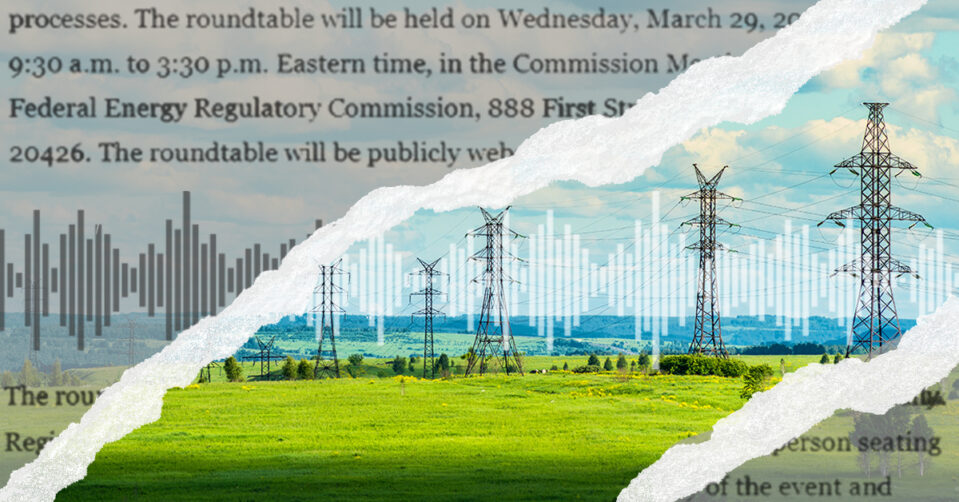Reflections on FERC’s Environmental Justice Roundtable
Jessica Bell (Energy Director & Deputy Director) / May 25, 2023

Organizations and individuals recently submitted comments to the Federal Energy Regulatory Commission (FERC) following its Roundtable on Environmental Justice and Equity in Infrastructure Permitting. FERC held the roundtable on March 29 under the leadership of Acting Chairman Willie Phillips, who noted in his opening remarks that he “grew up in an environmental justice community in Alabama on the Gulf Coast.” While many applauded FERC for turning its attention to this important issue, there were also criticisms of FERC’s approaches and the procedural hurdles in the roundtable itself, serving to highlight the widespread barriers to energy and environmental justice.
This post discusses a few themes from some of the comments: (1) community engagement should lead to meaningful changes in permit reviews; (2) there are still many barriers to community engagement imposed by agency practices and procedures; and (3) the vacant seat at the Commission should be filled by someone who is committed to environmental and energy justice.
First, environmental justice must be on par with other factors in FERC’s decisionmaking: as Ben Jealous of the Sierra Club framed Commissioner Mark Christie’s “two Es” - economics and engineering - in infrastructure decisions: “We’re simply asking you to add a third one, environmental justice.” In comments following the roundtable, the Hip Hop Caucus stated: “FERC has failed to commit to making decisions based on environmental justice impacts, and has not rejected any project on those grounds despite mounting evidence of the adverse community impacts of projects.” Grassroots community leaders and allied organizations told FERC it must “immediately stop making permitting decisions until adequate environmental justice and greenhouse gas guidances are finalized.” Without guidance on how to handle permitting decisions once there is a finding of environmental or energy injustice, FERC may continue to rely on a decisionmaking process that does not reflect environmental justice principles or honor the Biden Administration’s commitment to address disproportionate harm in already vulnerable communities.
Second, participants noted the barriers to engagement in the roundtable itself. At the roundtable, Roishetta Ozane, founder, director, and CEO of the Vessel Project of Louisiana, highlighted the logistical and financial hurdles she faced in attending. Ms. Ozane was one of the few panelists from a frontline community speaking on the roundtable; she prefaced her remarks: “it’s not fair for me to have to represent the entire state of Louisiana, and all of the injustices that we’re facing along the Gulf Coast.” In post-roundtable comments, Maury Johnson, an individual landowner affected by the Mountain Valley Pipeline, noted that there were no representatives from Appalachia or many other areas of the country at the roundtable. Mr. Johnson also detailed the quick deadline that panelists faced for deciding if they would be able to participate in person and stressed the need for more sustained and focused attention on environmental justice concerns. Commenters also offered critiques of the Office of Public Participation. For example, Earthjustice, NRDC, Center for Biological Diversity, and Sierra Club noted that the Office’s online materials were still extremely dense and hard to read, as well as the fact that they are not offered in multiple languages. WE ACT for Environmental Justice suggested dedicated staff in the Office could serve as EJ Liaisons. Comments on behalf of the Union Hill Freedmen Family Research Group, AMMD-Pine Grove Project, and Brown Grove Preservation Group detailed how FERC could do meaningful outreach to communities by considering the needs and the context of the particular community.
Third, commenters emphasized the need to fill the still-vacant seat at FERC with someone with a background in and commitment to environmental justice. Grassroots community leaders and allied organizations pointed to “the missteps in the planning and execution of” the roundtable as evidence of this need. President Biden must nominate, and the Senate must confirm, a commissioner to fill this vacancy, which has been open since Richard Glick’s departure at the end of 2022 when he was not renominated.
More broadly, WE ACT for Environmental Justice urged FERC to look at “the extensive amount of work that front line communities and advocates have placed before the commission in years past,” not only the submissions for this roundtable. Communities and advocates have been providing information to FERC for years around FERC’s gas certificate policy statement and in rulemakings, its establishment of the Office of Public Participation, and in individual proceedings. This roundtable cannot be called a first step, but hopefully it will be a meaningful one for FERC.
